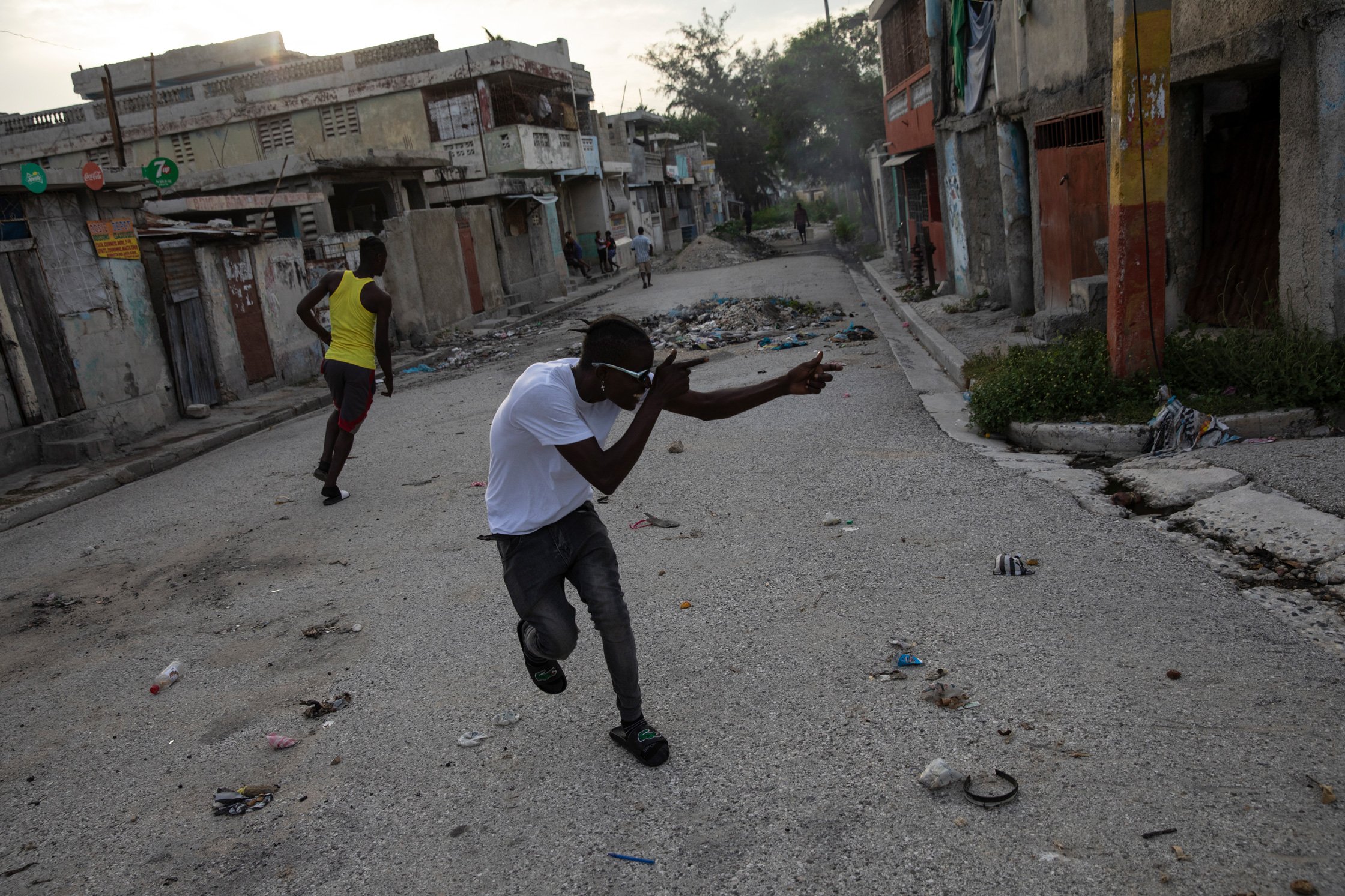In violence-plagued nation, Haitians find ways to keep on living

Violence permeates every fiber of Haitian society. It used to linger on the outskirts of the capital, targeting the poorest, but now everyone — from street vendors to doctors to schoolchildren — are in its grip.
And yet, people find ways to keep on living.
For the first half of 2024, Associated Press photographers have documented how violence has impacted the capital, Port-au-Prince, and what it looks like on a daily basis as people go about their lives, going to work, school and grocery shopping.
This gallery contains graphic content.
People on motorcycles navigate around a body lying in the middle of the road in the Petion-Ville neighborhood of Port-au-Prince, April 22, 2024. (AP Photo/Ramon Espinosa)
It’s become increasingly common to see victims of violence sprawled on busy streets.
You see people on motorcycles zooming past bodies in the middle of a road or sidestepping them on sidewalks. Some glance at the bodies; others just stay the course. It’s also common to see dogs or other animals gnawing on the remains of a body left abandoned on a street.
Houses blanket the slopes of the Jalousie neighborhood of Port-au-Prince, May 13, 2024. (AP Photo/Ramon Espinosa)
A child watches from an opening in a security gate as residents flee their homes due to gang violence, in Port-au-Prince, March 9, 2024. (AP Photo/Odelyn Joseph)
People run for cover as shots ring out near the National Palace, in Port-au-Prince, April 30, 2024. (AP Photo/Ramon Espinosa)
Jimmy Chérizier, best known as Barbecue, and the leader of the "G9 and Family" gang, sits on a bench while speaking into his cell phone in the Delmas 6 neighborhood of Port-au-Prince, March 5, 2024. A former elite police officer, Barbecue is blamed for the ongoing killings and attacks in the Solino community. (AP Photo/Odelyn Joseph)
Every day, gunfire scatters Haitians who flee the streets and hide behind a wall or a column of a nearby building for protection as gangs battle for more turf.
Gang violence has displaced more than half a million people, forcing tens of thousands to cram into makeshift shelters including schools.
Still, you see people from children to the elderly finding moments of hope, smiling, laughing, playing, studying. Moments of calm, however brief, like when a child rested her head on her mother’s lap as she got her hair styled at a shelter.
Haiti has been under siege by violent gangs that control 80% of the capital and whose tentacles reach beyond Port-au-Prince.
Blood from a man shot dead, trickles into the crevices of stepping stones in the Petion-Ville neighborhood of Port-au-Prince, May 3, 2024. (AP Photo/Ramon Espinosa)
Baby Gustave and her 12-year-old daughter Juliana St. Vil pose for a photo at a school converted into a shelter where they now live after fleeing gang violence in their neighborhood, in Port-au-Prince, May 18, 2024. (AP Photo/Ramon Espinosa,)
Kenyan police, the first contingent of U.N.-backed foreign police, stand at their base in Port-au-Prince, June 26, 2024. (AP Photo/Marckinson Pierre)
Security officers escort Prime Minister Garry Conille through the General Hospital after authorities announced police took control of the medical institution from armed gangs, in Port-au-Prince, July 9, 2024. (AP Photo/Odelyn Joseph)
Gang leader Jimmy Chérizier, best known as “Barbecue,” who has urged Haitians to mobilize against the government, holds a press conference in the Delmas 6 neighborhood of Port-au-Prince, July 5, 2024. (AP Photo/Odelyn Joseph)
The country is now at a crossroads as it welcomes the fourth major foreign intervention in its history: a U.N.-backed mission led by Kenya that will soon be joined by personnel from countries including the Bahamas, Bangladesh, Barbados, Benin, Chad and Jamaica for a total of 2,500 police and soldiers.
Haitians hope they can return to their regular routines and break free from the shackles of gangs that have killed, raped and injured thousands of people in recent years.
Haiti also is preparing to hold long-awaited elections as it slowly emerges from years of political tumult that include the 2021 assassination of President Jovenel Moïse; the April resignation of Prime Minister Ariel Henry and the installation of a new prime minister and a transitional presidential council.
Lead caption: A girl plays a jump rope game at a school housing residents displaced by gang violence in Port-au-Prince, May 15, 2024. (AP Photo/Ramon Espinosa)
Text from the AP News photo gallery, In documenting violence in Haiti, you find bodies, but also ways keep on living
Photos by Ramon Espinosa, Odelyn Joseph and Marckinson Pierre

































